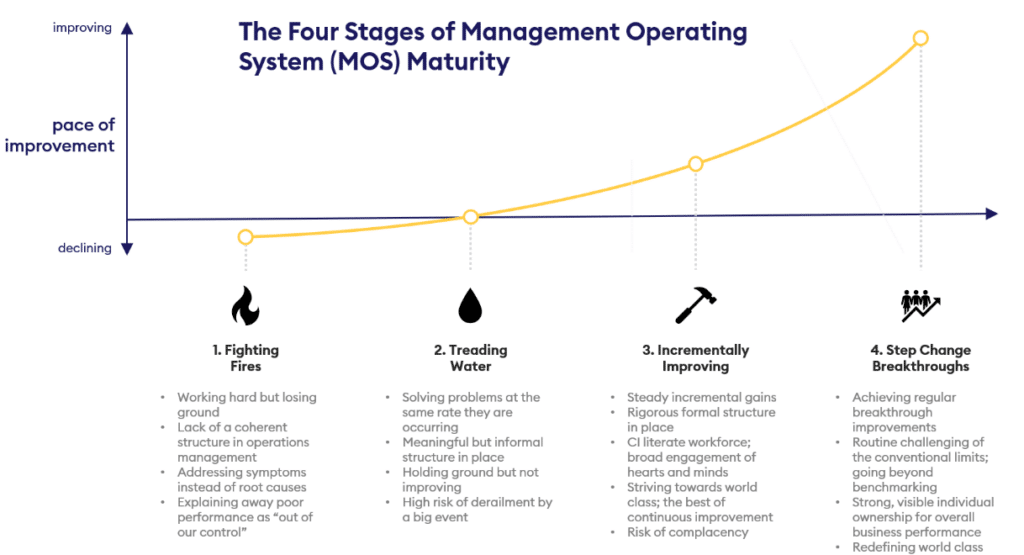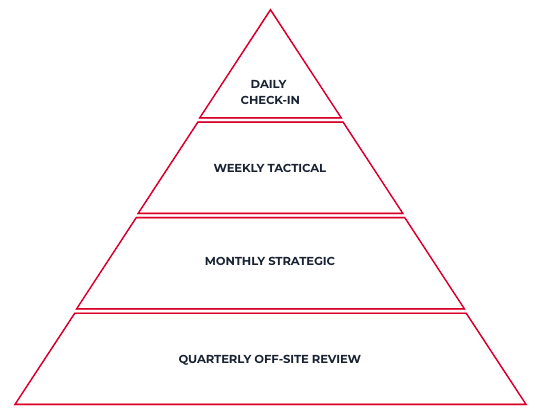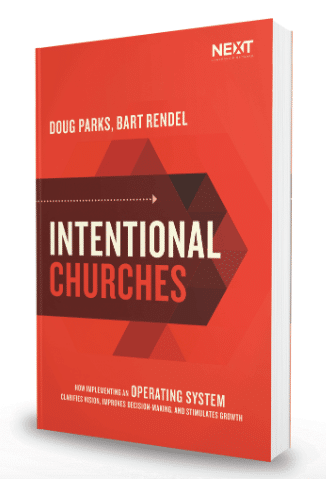
Every manager has a management operating system. Some are intentional and some ebb and flow with the leader. (Leader and manager are used interchangeably in this article) Most managers realize very early on that intentionality is a requirement for success. In fact, you are getting results right now because of your competency. But can you replicate it? Carl Jung said,
“Until you make the unconscious conscious, it will direct your life and you will call it fate.”
To scale a business, I would suggest you need to master your product and service but more importantly, you need a great management operating system. But what is a MOS? CEO Magazine states it this way;
“The use of management operating systems, or MOS as it is often referred to, enables organisations to better control the flow of work and production, driving higher outcomes in customer service, quality and cost.”
Ultimately, if the leader has clarity on what needs to be done, it is his/her responsibility to plan, organize, direct and control resources to the desired end of stakeholder needs.
How Do We Develop A MOS?
Late in the 20th Century, Stephen Covey informed us of a system that is both effective for the individual and the organization in his groundbreaking book, The 7 Habits of Highly Effective People:
- Begin with mission
- Identify all the roles required to achieve the mission
- Set a series of goals for each role, and
- Set weekly priorities that drive the goals
- Delegate the priority or do it yourself
Covey continued by saying we need to leverage ‘important’ priorities over ‘urgent’ ones. But, where is the discipline to organize, direct and control these plans? This is where a good MOS comes into play! A good management operating system should be simple to understand (maybe not easy to implement) . That said, a MOS is merely a set of tools and best practices that are proven and accepted throughout an organization. If you are a manager and haven’t studied Covey’s work you should.
Four Stages Of MOS Maturity
You may be reading this article right now and wondering, why have I never heard of this concept before? You aren’t alone. There are millions of managers around the world learning how to manage for better results and they are at various stages of maturity. There are actually four stages of maturity in this process:
- Fighting Fires
- Treading Water
- Incrementally Improving
- Step Change Breakthroughs

This movement from one phase to another requires a change effort. I’m not sure an organization could shift from level 1 to level 4 but I’m not leaving out that possibility. This notion of moving from stage 1 to stage 4 seems more like osmosis than a defined structure to implement. This is not to say that recognizing current conditions and applying intentional movement couldn’t move a team faster. Knowing this should motivate us to make real change.
What Tools Make Up A Good MOS?
An effective Management Operating System includes tools that are effective and timely. Patrick Lencioni would tell us to have strategic anchors. A few examples of anchors are: product superiority, lowest price in the market, and individualized service.1 This tool provides a lens to make decisions about tough problems. Lencioni also gives us a methodology for running good meetings in his book, Death By Meeting. He suggests there are four primary meetings:

These two tools are a very good start. But there are many many more things a good manager can do to achieve great levels of performance and provide greater stakeholder value.
Always Start With Why!
When your team knows why they do what they do, they do it better. It leads to healthy teams. Team health is probably the greatest indicator of an organization’s ability to harness team energy and drive results. Lencioni would say that “Health Trumps Smarts.” To this end, we find our answer by addressing the following questions:
- Why do we do what we do? Core Values
- Where do we want to be in five or ten or more years? Vision
- What do we want to get done? Our unique differentiator? Mission
- How are we going to get it done? Strategy
- When will we know we are successful? Metrics
So, we need systems that inform and control our why, where, what, how and when. And, we need to have a system that leads our teams to address and deliver answers to these questions. A very simple methodology is to ask how should we plan, organize, direct and control our business.
Where Do I Find A Management Operating System For My Business?
There is one organization who has designed a system for businesses and non-profits. It is the Entrepreneurial Operating System. “EOS®, the Entrepreneurial Operating System, is a complete set of simple concepts and practical tools that has helped thousands of entrepreneurs get what they want from their businesses. By mastering this simple way of operating, leadership teams of growth-oriented companies systematically and permanently improve.” I will agree that the system is simple but I would add that it isn’t always easy to implement. Anyone who has ever initiated a change effort knows this to be true.
Where Do I Find An Operating System For My Church?
I have been involved in church leadership starting as a Small Groups Facilitator to Executive Minister of a mega church with multiple campuses. With more complexity comes more difficulty in getting people to deliver results. As an Executive Minister, I had a leadership philosophy and tools I used weekly, monthly, quarterly and annually to keep the team focused and delivering on results. I ran some great meetings and some that were simply awful!
Probably the most important thing and most effective thing I did was to ensure the vision was fully imbedded with the staff. Every week for several months we would begin our meetings with one person from the team standing before the group teaching the vision. When they knew they may be the teacher for the group, they made sure to learn how to teach it. My intended consequence was achieved in that every team member knew the strategic vision.
What I Wish I had Known Then
There is one resource I wish I would have gotten my hands on sooner! Without any hesitation, I can say Bart Rendel and Doug Parks have a Management Operating System for churches that has no rival! Doug and Bart have been helping churches, nonprofits and for profit businesses for more than ten years. Their recent book, Intentional Churches, provides dozens of principles and tools that can help you double your church’s impact in your community every five years or faster. It is relationally driven, aligning church leadership thinking and methodology to Biblical basics. Consequently, evangelistic focused churches and discipleship focused churches benefit from this training. The beauty of Intentional Churches model is they intentionally mobilize the 99 to reach their 1s. (Luke 15)

I like it so much that I jumped at the chance to collaborate with them. My business is helping individuals scale their skills and systems to grow their careers, income and personal satisfaction. What makes me unique is I have worked in several organizations that had growth strategy in mind and were growing exponentially. When Pizza Hut introduced Pan Pizza I was a new Area Manager. Later we introduced Personal Pan Pizza and migrated away from eat-in and carryout establishments to delivery operations. I joined Papa John’s at store 400 and left at store 3,000. That was growth! As an executive minister, I joined a church and we purchased a beer warehouse and converted it to a sports-plex that funded much of the ministry of the church.
In closing, do yourself a favor and document your conscious competency and implement a Management Operating System. All church leaders should consider implementing Intentional Churches. You should buy the book if nothing else! If you are an entrepreneur or business owner, look at EOS and start with Traction. And, if you would like some help from me, please reach out.





